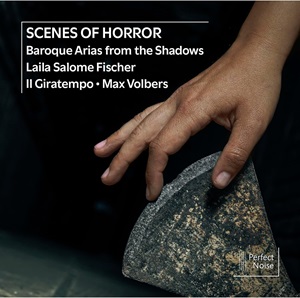
Scenes of Horror: Baroque Arias from the Shadows
Laila Salome Fischer (mezzo-soprano)
Il Giratempo/Max Volbers
Handel, Vivaldi, Graun & Ariosti
rec. 2022, Johann-Sebastian-Bach-Saal, Schloss Köthen
Texts & translations in English, French & German
Contents beneath review
Perfect Noise PN 2306 [57]
While I appreciate that finding a new way of marketing classical music represents something of a challenge, the whole premise of this recital strikes me as desperately gimmicky. The hyperbole of conductor Max Volbers’ introductory note typifies its jaunty tone: “…Baroque librettists were not the only ones who derived sadistic pleasure from seeing their character suffer. We also found a devilish delight in sending Laila Salome Fischer through this program’s series of nightmares.” Really? Is that what making vocal art is about?
The title of this rather short-measure compilation, too, is somewhat inaccurate, if not misleading. Two of the eight items here, occupying eight of the seventeen tracks and comprising some fourteen of the total 57 minutes of music – a total I had to calculate as it is not provided, perhaps indicating some embarrassment at its brevity – consist of orchestral music by Vivaldi, not arias.
Still, none of that much matters if we accept the theme as a unifying device and the performances are good. An instantly perceptible problem is that Laila Salome Fischer’s mezzo-soprano is somewhat over-powered by the vibrancy and volume of the baroque instrumental accompaniment, an issue compounded by her rather cloudy tone and the lack of heft in her lower register. She makes considerably more noise in the upper reaches of her voice, however, as in the rather abrupt increase in volume at the conclusion of the opening aria, when she flicks a top G in the great aria “Scherza infida” from Handel’s wonderful Ariodante, but I instantly dislike the way she smooths out and elongates the notes rather affectedly and croons the melismas as if it were a love-song rather than an outpouring of pain and betrayal. Strangely, too, for a voice specialising in baroque repertoire, she has an annoying mannerism of singing a longer note straight then introducing excessive vibrato at its close. The voice itself has no special quality of tonal distinction; turn to Janet Baker or David Daniels to hear this sung superbly, with real investment in the words and emotions. Ms Fischer sounds to me like a young artist whose vocal registers are not fully developed and who has yet to learn how to imbue text and notes with impact. The extended excerpt from Graun’s unknown Montezuma has no special character at all; without the libretto, the listener would be hard pushed to derive any impression of the character’s circumstances – and the music itself is not sufficiently distinguished or interesting enough to carry the burden of bland interpretation. If I sound harsh, let me give specifics: the opening sustained B-flat of track 7 is crooned, unsteady and lacks tonal amplitude before it is given a little vibrato shake which is not musical; the opening of the Ariosti aria is again oddly crooned and disembodied; it is not proper, fully-voiced singing; it is twittering.
I have probably said enough. The two orchestral items are very spare with a minimal number of instruments, and Max Volbers’ recorder is preternaturally prominent. They are very skilfully played, although the recording is very close and almost glaring. I always enjoy Vivaldi’s palette of instrumental colours and the striking contrast of moods he evokes in his music, but there is nothing about the pieces chosen which is especially audibly germane to the theme of the recital; they could as easily be considered as “pure music”.
I am sorry if I sound unduly negative about this release, but I cannot in all conscience find much in it to enthuse over.
Ralph Moore
Help us financially by purchasing from



Contents:
Georg Friedrich Handel (1685-1759)
Jephta HWV 70
Scenes of Horror, Scenes of Woe (Storgé)
Antonio Vivaldi (1678-1741)
L’Olimpiade RV 725
Sinfonia in C major
Handel: Ariodante HWV 33
Scherza infida in grembo al drudo
Carl Heinrich Graun (1704-1759)
Montezuma GraunWV B:1:29
Recit Qual orribil destino (Montezuma)
Aria Ah, d’inflessibil sorte
Recit Ma qual rumore
Aria Si, corona, i tuoi trofei
Vivaldi:
Concerto ‘La Notte’ G minor RV 439
Attilio Ariosti (1666-1729)
La fede ne’ tradimenti
Questi ceppi, e quest’ orrore (Fernando)
Handel: Alcina
Sta nell’Ircana (Ruggero)
Handel: Hercules
Recitativo accompagnato Where shall I fly (Dejanira)

















